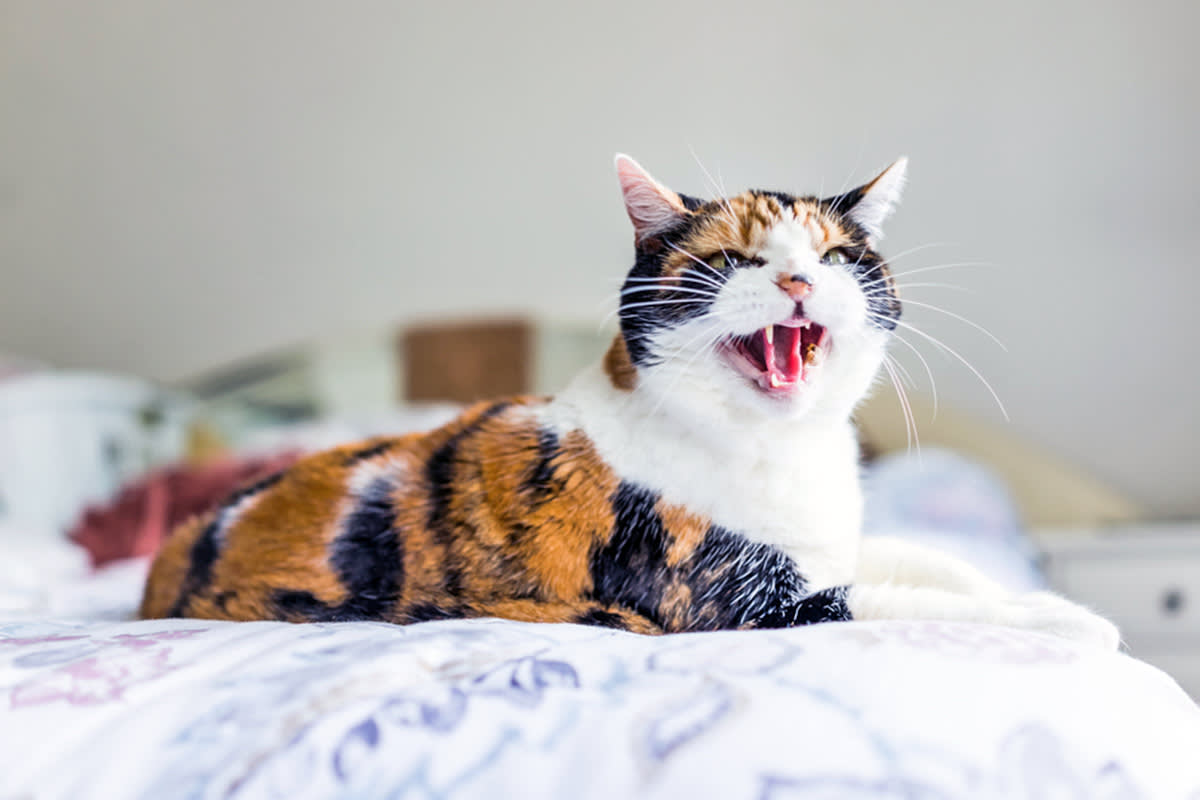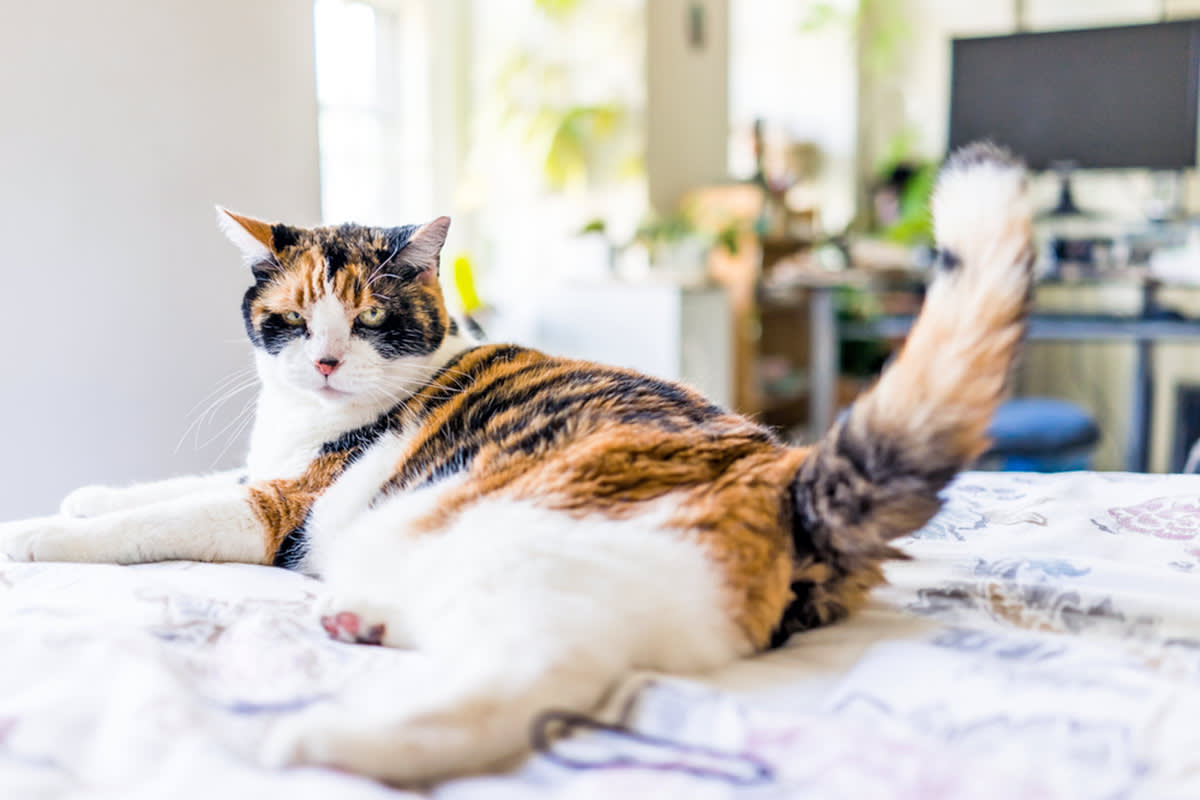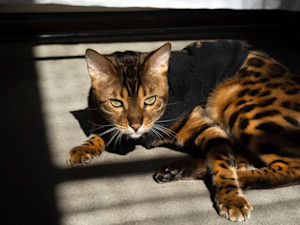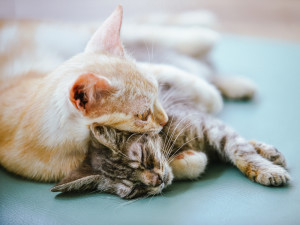Do Calicos Really Have More ‘Cat-titude’ Than Other Cats?
More colors mean more spice, after all.
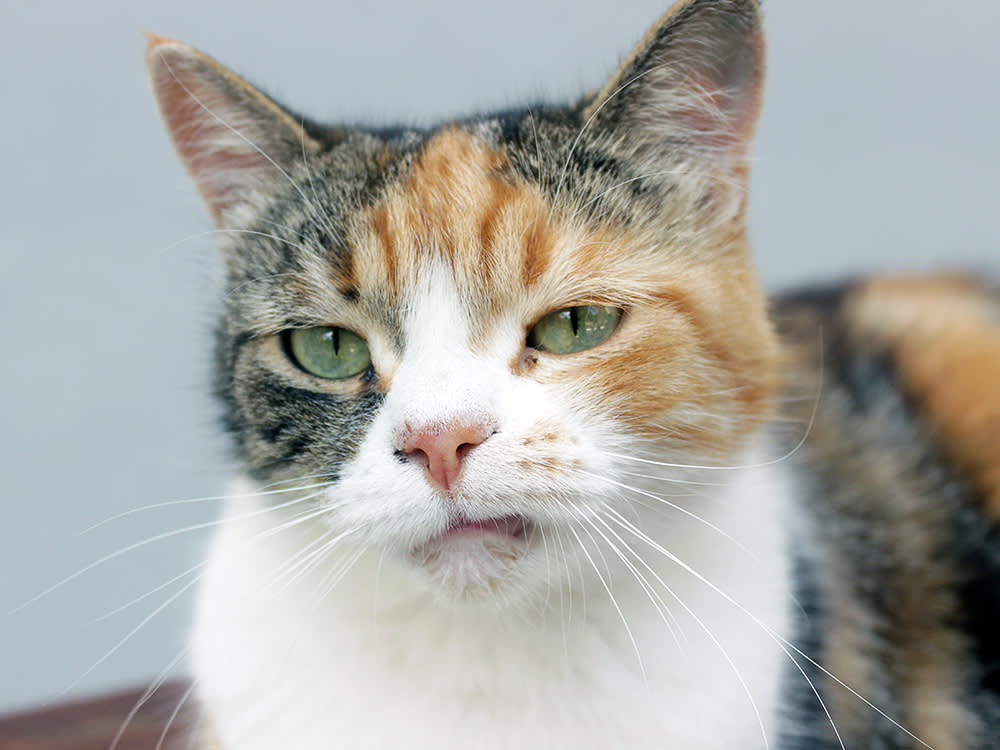
Share Article
You’ve heard of “tortitude,” right? That’s the idea that tortoiseshell cats are spicier than other felines — more aloof, demanding, or territorial. Come at a tortie wrong and you’re liable to catch a paw. At least, that’s the stereotype.
It’s not totally true, though. Just like it's not really true that orange cats are all derpy or that tuxedo catsopens in new tab are all smart. The internet loves assigning personalities based on color, but those stereotypes usually stem from limited personal experience and cherry-picked anecdotes — not science.
And while it may seem harmless enough — “It’s just a joke,” some say, with a laugh and an eye-roll — stereotypes have a way of solidifying into “fact” in the minds of people with little firsthand knowledge. That matters, because these assumptions often shape how cats are adopted, cared for, and understood — sometimes to the cat’s detriment.
So imagine my surprise when my editor told me that when her calico cat was being feisty at a check-up last month, the vet told her that calico cats like hers really do have more attitude — or, as she put it, “cat-titude” — than other cats. I was skeptical. “Here we go again,” I thought. But curiosity got the better of me (appropriate for a story about cats, though my inquisitiveness did not kill me).

Although I wasn’t able to speak to my editor’s vet, I did talk to two others: Dr. Hyun Han, a California-based veterinarian with TelaVets.comopens in new tab and Dr. Aimee Warner, resident veterinarian at Waggelopens in new tab. I also spoke with feline behavior expert Jennifer Van de Kieft from Cat Advocate Feline Behavior Solutionsopens in new tab.
“Is there any truth to this idea,” I asked them all, “or is it just another stereotype?”
What is cat-titude, anyway?
Before we can assess whether calicos have more of it, we need to define it. And that’s tricky, because “cat-titude” is a new term — one that hasn’t quite settled into a universal meaning.
“I think it’s when a cat knows what they want and stands up for themselves to get it,” Van de Kieft says.
Dr. Han offers a more colorful definition: “It’s a mix of independence, sass, confidence, and the willingness to push back. A cat with cat-titude isn’t shy about swatting your hand if they’re done being pet or giving you side-eye when dinner is late. They’re expressive, particular, and often very entertaining.”
Whatever your definition, it’s important to remember, as Dr. Warner points out, that cat-titude “is not a medical term.” It has no scientific basis. Nor is it inherently good or bad. Some people love a cat who pushes back. Others, not so much.
Personally, I prefer a permissive cat — one who lets me scoop them up, smoosh my face into their belly, and trim their nails without complaint. That said, my current foster, Akela, is probably the spiciest cat I’ve had in years — and I adore her. She’s incredibly affectionate most of the time, but when the mood strikes, she’ll grab my hand and “bite.” She has no teeth (she’s 17), and I keep her nails trimmed, so it doesn’t hurt. Honestly, I find her feisty streak charming.
Still, if I were adopting and someone told me a cat had a lot of “cat-titude,” I might pass — not because I think it's bad, but because I know it’s not my ideal match.
Is there any science behind the calico stereotype?
“There is no science to back up a link between coat color and personality,” Dr. Warner says. “There are anecdotal trends that suggest calicos are bold or feisty, but this likely has more to do with how people perceive their behavior than with anything biologically programmed.”
In other words: Just because people notice something doesn’t mean it has a genetic basis.
This doesn’t mean such a link definitely doesn’t exist — only that it hasn’t been proven. One day, researchers might uncover some connection between fur color and temperament. But even if they do, personality is never just a matter of nature or nurture — it’s both. Even if a cat is predisposed to be “spicy,” that trait may never surface, depending on how the cat is raised, handled, and loved.
Why do people think calicos have more cat-titude?
Even without proof, the belief persists — and for some, it feels true. “I and many of my colleagues have noticed that calicos often seem more opinionated,” Dr. Han says. “They’re quick to let you know what they like and don’t like. Are they actually spicier than other cats? Maybe not across the board, but they do seem to lean a little feistier on average.”
Do they, though? Or is their behavior just more memorable?
Calicos are rare, and their coats are visually striking — so when they scratch or growl, people notice. “When a calico acts out, it sticks with you more than when a tabby does,” Dr. Warner says.
Also worth noting: Nearly all calicos are female — same with torties — and many people (erroneously) believe female cats are less affectionate than males. Even that idea lacks clear scientific support. I’ve had a dozen or more cats in my life. My first was a feisty female, but plenty of other girl cats I’ve had have been gentle, affectionate lap-seekers.
So, would calicos have the same reputation if they were all male? Given the way society often views maleness more favorably, probably not. Or, if they did, that “spice” might be seen as confidence rather than attitude.
Does this stereotype help or hurt calicos?
Whether you see cat-titude as a feature or a flaw depends on your perspective. “Some people are drawn to the idea of a spicier cat,” says Dr. Han, “while others might be more hesitant. If anything, the stereotype oversimplifies what are really just bold, complex little animals.”
“I’m not a fan of cats being described in negative ways,” Van de Kieft says. “They have unique personalities. And if they do seem to have ‘attitude,’ there’s often a good reason — they’re overstimulated, under-stimulated, or just plain hungry.”
Spicy or not, it’s important to remember that behavior is shaped far more by experience, socialization, and personality than by coat color. Every expert I spoke to — even those who noted trends — emphasized that they’ve also known calicos who were sweet, calm, and cuddly.
“Some of the most memorable patients I’ve had were calicos,” Dr. Han says. “But I’ve also met sweet, lap-loving calicos too.”
Van de Kieft weighs in with her own anecdote: “My father had a very gentle calico. No attitude or spiciness. She was deeply bonded to him. And when he was sick, she would sit on his chest and cuddle with him.”
So, whether you’re looking for a firecracker or a lap cat, don’t judge a kitty by her coloring. Look past the coat — and let the cat tell you who they are. Because, who knows, they could end up being the perfect cat for you.

Charles Manning
Charles Manning is an actor and writer based in New York City. In his free time he likes to cook, go swimming at the public pool, volunteer at the LGBTQ senior center, and foster senior and special-needs cats. His work has previously appeared in Cosmopolitan, Elle, Marie Claire, Harper’s Bazaar, Seventeen, and Nylon.
Related articles
Are Tuxedo Cats More Intelligent Than Other Cats—or Just More Dapper?
Find out if the internet-fueled rumor is true.
![a woman holds a cat against a celestial background]()
What Cat Breed Are You Based on Your Zodiac Sign?
Ragdoll? Bengel? Chaotic orange cat?
![Shiny Bengal cat laying on the floor in the sun.]()
Scientists Discover Why Some Cats Sparkle—Yes, Some Cats Sparkle
It’s called the glitter gene.
What Are the Consequences of Breeding Designer Cats?
As shelters overflow with animals, it’s worth asking.
![two bonded kittens snuggling]()
Why You Should Adopt a “Less Adoptable” Cat
Here’s why bonded kitties, senior cats, and felines with FIV make just as amazing pets as any other.

